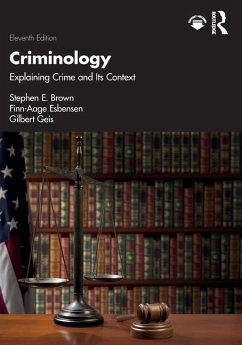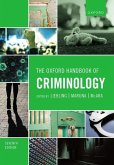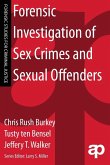- Broschiertes Buch
- Merkliste
- Auf die Merkliste
- Bewerten Bewerten
- Teilen
- Produkt teilen
- Produkterinnerung
- Produkterinnerung
Criminology: Explaining Crime and Its Context, Eleventh Edition, offers a broad perspective on criminological theory.This revision offers new chapters on critical theory and on life-course criminology and is updated throughout to reflect current trends in criminological theory and data.
Andere Kunden interessierten sich auch für
![The Oxford Handbook of Criminology The Oxford Handbook of Criminology]() Alison Liebling (Professor of Criminology and Pro Criminal JusticeThe Oxford Handbook of Criminology45,99 €
Alison Liebling (Professor of Criminology and Pro Criminal JusticeThe Oxford Handbook of Criminology45,99 €![Fifty Key Thinkers in Criminology Fifty Key Thinkers in Criminology]() Keith Hayward / Shadd Maruna / Jayne Mooney (eds.)Fifty Key Thinkers in Criminology29,99 €
Keith Hayward / Shadd Maruna / Jayne Mooney (eds.)Fifty Key Thinkers in Criminology29,99 €![Introducing Criminology Introducing Criminology]() Clive ColemanIntroducing Criminology58,99 €
Clive ColemanIntroducing Criminology58,99 €![Criminology Criminology]() Sandra WalklateCriminology19,99 €
Sandra WalklateCriminology19,99 €![Against Cybercrime Against Cybercrime]() Kevin F. SteinmetzAgainst Cybercrime42,99 €
Kevin F. SteinmetzAgainst Cybercrime42,99 €![Forensic Investigation of Sex Crimes and Sexual Offenders Forensic Investigation of Sex Crimes and Sexual Offenders]() Chris Rush BurkeyForensic Investigation of Sex Crimes and Sexual Offenders52,99 €
Chris Rush BurkeyForensic Investigation of Sex Crimes and Sexual Offenders52,99 €![Against Cybercrime Against Cybercrime]() Kevin F. SteinmetzAgainst Cybercrime152,99 €
Kevin F. SteinmetzAgainst Cybercrime152,99 €-
-
-
Criminology: Explaining Crime and Its Context, Eleventh Edition, offers a broad perspective on criminological theory.This revision offers new chapters on critical theory and on life-course criminology and is updated throughout to reflect current trends in criminological theory and data.
Hinweis: Dieser Artikel kann nur an eine deutsche Lieferadresse ausgeliefert werden.
Hinweis: Dieser Artikel kann nur an eine deutsche Lieferadresse ausgeliefert werden.
Produktdetails
- Produktdetails
- Verlag: Taylor & Francis Ltd
- 11 ed
- Seitenzahl: 536
- Erscheinungstermin: 26. Juni 2024
- Englisch
- Abmessung: 254mm x 182mm x 37mm
- Gewicht: 1090g
- ISBN-13: 9781032328416
- ISBN-10: 103232841X
- Artikelnr.: 70005148
- Herstellerkennzeichnung
- Libri GmbH
- Europaallee 1
- 36244 Bad Hersfeld
- gpsr@libri.de
- Verlag: Taylor & Francis Ltd
- 11 ed
- Seitenzahl: 536
- Erscheinungstermin: 26. Juni 2024
- Englisch
- Abmessung: 254mm x 182mm x 37mm
- Gewicht: 1090g
- ISBN-13: 9781032328416
- ISBN-10: 103232841X
- Artikelnr.: 70005148
- Herstellerkennzeichnung
- Libri GmbH
- Europaallee 1
- 36244 Bad Hersfeld
- gpsr@libri.de
Stephen E. Brown is Professor of Criminology and Criminal Justice at Western Carolina University where he served as Department Head for over 10 years. He received his Ph.D. in Criminal Justice and Criminology from the University of Maryland in 1979. He went through the professorial ranks at East Tennessee State University, serving as Department Chair for 11 years, and left as Professor Emeritus in 2008. Brown has published articles in a number of journals, including Criminology, Journal of Criminal Justice, Journal of Criminal Justice Education, Criminal Justice Review, Youth and Society, and Social Science Quarterly. His areas of research interest have been broad, covering topics such as family violence, deterrence, delinquency, and application of statistics within criminology. He has served as a Trustee on the board of the Academy of Criminal Justice Sciences, and as editor of the American Society of Criminology's The Criminologist. He co-edited the Routledge Handbook on Deviance in 2018. Finn-Aage Esbensen is an Emeritus E. Desmond Lee Professor of Youth Crime and Violence in the Department of Criminology and Criminal Justice at the University of Missouri, St. Louis. He served as Department Chair from 2009 to 2018. His previous faculty positions were at Western Carolina University (1982-1986) and the University of Nebraska at Omaha (1992-2001). In addition to these academic appointments, he has held research positions at the following institutions: the Center for Criminal Justice at Harvard Law School (1974); Catholic University (1976-1977); the Behavioral Research Institute, Boulder, Colorado (1980-1981); and the Institute of Behavioral Science, University of Colorado (1987-1992). He received his B.A. and M.A. from Tufts University and his Ph.D. from the University of Colorado. He is the author of more than 100 articles and chapters examining, among other topics, youth gangs and violence, methodological issues, and victimization. His book (with Cheryl L. Maxson), Gang Transitions and Transformation in an International Context, was published in 2016. He is a Fellow of the American Society of Criminology (2014) and the Western Society of Criminology (2002). He is also the recipient of the Gerhard O.W. Mueller Award from the Academy of Criminal Justice Sciences and the Paul Tappan and President's Awards from the Western Society of Criminology. From 1998 through 2001, he served as editor of Justice Quarterly. Gilbert Geis, Professor Emeritus in the Department of Criminology, Law, and Society at the University of California, Irvine, died November 10, 2012, at age 87. Geis received his doctorate at the University of Wisconsin, Madison, and was a faculty member at the University of Oklahoma and California State University, Los Angeles, before joining the University of California, Irvine faculty in 1971, where he played a significant role in establishing the School of Social Ecology and the Department of Criminology, Law, and Society. Geis had the honor of being a member of Lyndon Johnson's President's Commission on Crime, and was a former president of the American Society of Criminology and recipient of its Edwin H. Sutherland Award for outstanding research. He was the recipient of awards by the Association of Certified Fraud Examiners, the Western Society of Criminology, the American Justice Institute, and the National Organization for Victim Assistance. The National White-Collar Crime Research Consortium named its distinguished scholar award in his honor. Geis was a giant in criminology research and education with more than 500 articles and book chapters and 28 books to his name.
PART 1: FOUNDATIONS FOR CRIMINOLOGY Chapter 1 Crime and Criminology Chapter
2 The Relativity of Law, Crime, and Deviance Chapter 3 Crime Data and
Distribution PART 2: THEORIES OF CRIME Chapter 4 Deterrence and Rational
Choice Theories of Crime Chapter 5 Positivism and BioPsychoSocial
Criminology Chapter 6 Social Structure Theories of Crime Chapter 7 Social
Process Theories of Crime Chapter 8 Social Reaction Theories of Crime:
Labeling Chapter 9 Social Reaction Theories of Crime: Conflict and Beyond
Chapter 10 Life-Course Criminology PART 3: TYPES OF CRIME Chapter 11
Violent Crime Chapter 12 Economic Crime Chapter 13 Crimes without Victims
and Victims without Crimes
2 The Relativity of Law, Crime, and Deviance Chapter 3 Crime Data and
Distribution PART 2: THEORIES OF CRIME Chapter 4 Deterrence and Rational
Choice Theories of Crime Chapter 5 Positivism and BioPsychoSocial
Criminology Chapter 6 Social Structure Theories of Crime Chapter 7 Social
Process Theories of Crime Chapter 8 Social Reaction Theories of Crime:
Labeling Chapter 9 Social Reaction Theories of Crime: Conflict and Beyond
Chapter 10 Life-Course Criminology PART 3: TYPES OF CRIME Chapter 11
Violent Crime Chapter 12 Economic Crime Chapter 13 Crimes without Victims
and Victims without Crimes
PART 1: FOUNDATIONS FOR CRIMINOLOGY Chapter 1 Crime and Criminology Chapter
2 The Relativity of Law, Crime, and Deviance Chapter 3 Crime Data and
Distribution PART 2: THEORIES OF CRIME Chapter 4 Deterrence and Rational
Choice Theories of Crime Chapter 5 Positivism and BioPsychoSocial
Criminology Chapter 6 Social Structure Theories of Crime Chapter 7 Social
Process Theories of Crime Chapter 8 Social Reaction Theories of Crime:
Labeling Chapter 9 Social Reaction Theories of Crime: Conflict and Beyond
Chapter 10 Life-Course Criminology PART 3: TYPES OF CRIME Chapter 11
Violent Crime Chapter 12 Economic Crime Chapter 13 Crimes without Victims
and Victims without Crimes
2 The Relativity of Law, Crime, and Deviance Chapter 3 Crime Data and
Distribution PART 2: THEORIES OF CRIME Chapter 4 Deterrence and Rational
Choice Theories of Crime Chapter 5 Positivism and BioPsychoSocial
Criminology Chapter 6 Social Structure Theories of Crime Chapter 7 Social
Process Theories of Crime Chapter 8 Social Reaction Theories of Crime:
Labeling Chapter 9 Social Reaction Theories of Crime: Conflict and Beyond
Chapter 10 Life-Course Criminology PART 3: TYPES OF CRIME Chapter 11
Violent Crime Chapter 12 Economic Crime Chapter 13 Crimes without Victims
and Victims without Crimes









